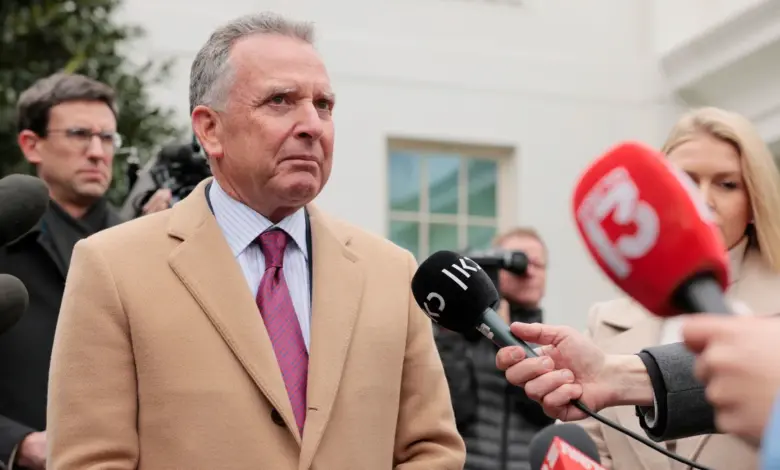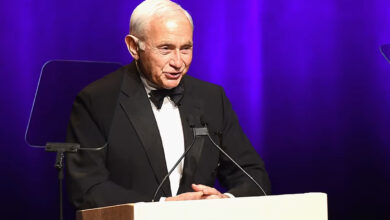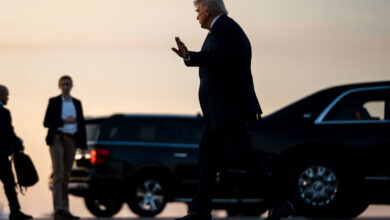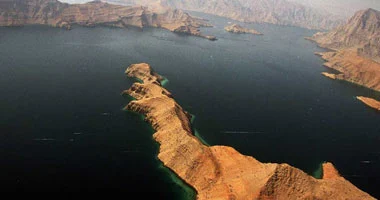
Iran and the United States began high-stakes talks to reach a new nuclear deal on Saturday, foreshadowed by President Trump’s threat of military strikes as a consequence of failure and Tehran’s warning any attack on it would drag the US into a broader Middle Eastern conflict.
The meeting, being held in the Gulf Arab nation of Oman, could be the first direct talks between Iranian and American officials in a decade, though Iran insists they will be indirect – with mediators acting as go-betweens for the two nations.
Iranian foreign ministry spokesperson Esmaeil Baqaei said on X on Saturday that “Indirect talks” between Iranian Foreign Minister Abbas Araghchi and the Trump administration’s Middle East envoy Steve Witkoff “began with the mediation of Omani Foreign Minister Badr Al Busaidi.”
Both parties will be seated in separate rooms and will convey their views to each other through the Omani minister, he said. The US has not confirmed that talks have begun.
Iran is seeking an “initial understanding” with the US that could lead to a negotiations process, Araghchi said upon arriving in the Omani capital Muscat.
It’s “too early” to speak about a timetable for the talks, which depends on “sufficient will on both sides,” he said.
President Donald Trump has given Tehran a two-month deadline to accept a deal that would lead to Iran shrinking its nuclear footprint or eliminating its program altogether.
“I want them not to have a nuclear weapon. I want Iran to be a wonderful, great, happy country, but they can’t have a nuclear weapon,” Trump said aboard Air Force One on his way to Florida on Friday night.
The talks come after the Islamic Republic has seen its regional power projection significantly weakened over the past 18 months by Israeli strikes on its proxies, the toppling of Bashar al-Assad in Syria, and unprecedented attacks inside its own borders.
The stakes on Saturday are high: Trump said military strikes are possible against Iran if a new nuclear deal isn’t reached, though he said Israel – which has been advocating for an attack on Iran – would take the lead.
“If it requires military, we’re going to have military,” Trump said on Wednesday. “Israel will obviously be very much involved in that. They’ll be the leader of that.”
But Iran has repeatedly refused to negotiate under duress. It laid out its “red lines” for the talks on Friday, including “threatening” language, “excessive demands” regarding Iran’s nuclear program, and Iran’s defense industry, according to semi-state news agency Tasnim, likely referring to Tehran’s ballistic missile program, which the United States’ Middle Eastern allies see as a threat to their security.
Trump administration Middle East envoy Steve Witkoff’s participation in the talks will add another file to the array of complex and intractable issues in his expanding portfolio, and follow a face-to-face meeting with Russian President Vladimir Putin on Ukraine in St Petersburg on Friday.
While the precise agenda for the talks remains unclear, the president has vowed to secure a “stronger” agreement than the 2015 nuclear deal brokered by the Obama administration, which was meant to curb Iran’s nuclear program. Trump withdrew from the deal in 2018, calling it a “disastrous” agreement that gave money to a regime that sponsored terrorism.
Trump wants to strike a deal that will prevent Iran from building a nuclear weapon, but has not specified how it would be different to the previous agreement, known as the Joint Comprehensive Plan of Action, or the JCPOA. That deal was intended to limit Iran’s nuclear program in exchange for the lifting of Western sanctions that have crippled its economy.
US officials have hinted they may push Iran to fully dismantle its nuclear program, including its civilian energy component, which Tehran is entitled to under a UN nuclear treaty.
Iranian officials, however, have dismissed that proposal as a non-starter, accusing the US of using it as a pretext to weaken and ultimately topple the Islamic Republic.
Experts say Tehran sees its nuclear program as its greatest source of leverage and abandoning it would leave the country dangerously exposed.
But the administration also says it is not only looking at a possible nuclear deal: It also wants to engage Iran on a broad range of issues, a senior administration official said.
The meeting on Saturday will test if Iran is willing to have high-level discussions, that could lead to negotiations over Iran’s nuclear program, ballistic missile program, and support for proxies in the region, the official said.
“Iran would be eager to jump back into something like JCPOA, so the question is: are they willing to put anything else on the table?” the official said.
Ahead of the meeting on Saturday, Araghchi reiterated that the talks “at this point” are “from our perspective, solely focused on the nuclear issue.”
Advisers try carrot while Trump wields stick
While Trump is threatening the prospect of war as a consequence for failed talks, other US officials have struck a far less bellicose tone.
Witkoff emphasized late last month that a diplomatic solution is within reach. In an interview with Tucker Carlson, he touted US military strength and laid out Iran’s vulnerabilities but was quick to clarify: “This is not a threat.”
“If the Iranians ever listen to this broadcast, this is not me issuing a threat. It’s the president who has that authority,” he said.
One former US official said the talks could be a starting point for both sides to suss out whether further negotiations are even possible.
“Saturday at best is a table setting exercise, to determine whether a deal is even possible,” said a former US official who has negotiated with Iran on nuclear issues.
“I suspect Iran will purport to demonstrate flexibility as the devil is in the details in nuclear talks, and the details are unlikely to be addressed in this opening episode,” the former official said.
For now it’s not a negotiation, State Department spokesperson Tammy Bruce cautioned, but a meeting with a specific goal.
“The very specific thing that needs to be accomplished, which would make the world a much safer place, is to make sure that Iran never gets a nuclear weapon,” Bruce told reporters.
Iran’s supreme leader indicated with a recent letter to Trump an openness to talks that could lead to Iran agreeing to measures that would prevent it from building a nuclear weapon.
But the planning process for Saturday’s high-stakes talks have been bumpy.
At times this week there have been questions among those involved as to whether they were even going to happen, given Iran was saying they would only engage indirectly while Trump insisted there would be a direct meeting.
Constant threats against Iran serve as backdrop to talks
In a Washington Post article this week, Araghchi warned that a war on Iran would drag the US – and the region – into a costly conflict that a president, who was elected on an anti-war platform, would be eager to avoid.
“We cannot imagine President Trump wanting to become another US president mired in a catastrophic war in the Middle East – a conflict that would quickly extend across the region and cost exponentially more than the trillions of taxpayer dollars that his predecessors burned in Afghanistan and Iraq,” he wrote.
Trump administration officials have credited Israel’s actions for the position Iran finds itself in, with Witkoff saying Israel’s strikes left Iran’s defenses “eviscerated.”
But despite the united front with Israel that US administration officials have presented publicly, Trump’s announcement this week about Saturday’s talks seemed to come as a surprise to Israeli Prime Minister Benjamin Netanyahu, who was seated next to him. Two Israeli sources told CNN the announcement was “certainly not” to Israel’s liking.
Upon returning, Netanyahu, said that if the nuclear talks drag on, it may strike Iran anyway.
CNN previously reported that US intelligence agencies warned both the Biden and Trump administrations that Israel appears likely to strike targets associated with Iran’s nuclear program as part of that country’s mission to enact a regime change in the Islamic Republic.
CNN’s Michael Williams, Alayna Treene, Alireza Hajihosseini, Pauline Lockwood, Nadeen Ebrahim and Leila Gharagozlou contributed to this report.




